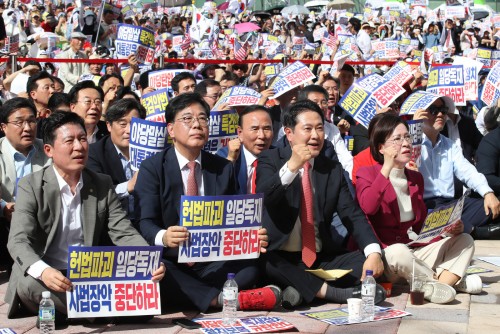 |
| Jang Dong-hyuk, leader of the opposition People Power Party (PPP), and Floor Leader Song Eon-seok shout slogans during a rally condemning the government at Dongdaegu Station Square in Daegu on September 21. / Source: Yonhap News |
The opposition People Power Party (PPP) is mounting an all-out offensive against the Lee Jae-myung administration ahead of the Chuseok holiday, combining street protests with filibusters in the National Assembly. The strategy aims to use the holiday’s so-called “golden time” for political influence, when family gatherings are traditionally fertile ground for debates that shape public opinion.
On September 21, PPP leaders, including Chairman Jang Dong-hyuk and Floor Leader Song Eon-seok, led a mass rally at Dongdaegu Station Square under the banner of resisting “opposition suppression and dictatorship.” Tens of thousands reportedly gathered, particularly in the conservative stronghold of Daegu and North Gyeongsang Province (TK). Party officials said starting in Daegu was intended to maximize mobilization, with similar rallies planned for Busan, Daejeon, Incheon, and Seoul.
Inside the legislature, the PPP is deploying filibusters to block bills the Democratic Party (DP) seeks to pass unilaterally, such as the government reorganization bill, which the PPP argues is a disguised attempt at judicial control by reducing the role of prosecutors. The party says filibusters are not merely stalling tactics but a stage to highlight DP’s “one-party dominance” and the government’s policy failures, while offering their own policy alternatives to project themselves as a “responsible opposition.”
Yet the filibuster has limits: the DP, with its majority, can move to a vote after 24 hours. Thus, the PPP is doubling down on parallel street demonstrations to maintain momentum. Party leaders have cautioned against over-identification with pro-Yoon Suk-yeol groups, banning “Yoon Again” placards and U.S. flags at rallies to avoid being confined to a hardline base. Analysts also warn that extended street actions may collide with upcoming events, including the October parliamentary audit, the budget session, and the APEC summit in Gyeongju, creating logistical challenges.
The DP has countered by framing itself as the “party of livelihood issues,” accusing the PPP of neglecting cooperation on public welfare in favor of political strife. The DP is also actively promoting President Lee’s policy achievements and pushing a slate of social welfare bills to sharpen the contrast: “political confrontation versus livelihood cooperation.”
With both sides banking on different narratives, the battle for holiday sentiment could prove decisive. Polls to be released shortly after Chuseok will offer the first glimpse of whether the PPP’s aggressive campaign resonates with the public or if the DP’s counterattack proves more effective.
Most Read
-
1
-
2
-
3
-
4
-
5
-
6
-
7





















